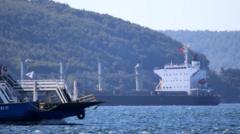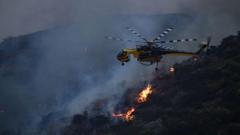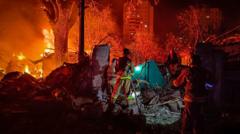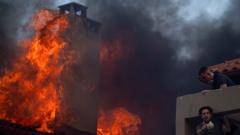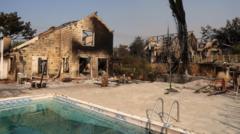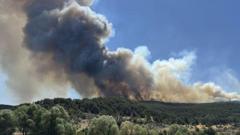As wildfires rage across Greece, particularly threatening Patras, a heatwave exacerbates the destruction. Over 10,000 hectares burned, prompting evacuations and requests for EU aid. The crisis expands throughout southern Europe, where heatwaves and fires test emergency services.
Rapid Wildfires Endanger Life in Greece Amidst Heatwave Crisis

Rapid Wildfires Endanger Life in Greece Amidst Heatwave Crisis
Unprecedented heat and strong winds intensify wildfires close to Patras, forcing mass evacuations and leveling communities across southern Europe.
A major city in western Greece faces peril as wildfires spread rapidly, driven by extreme temperatures and high winds affecting much of southern Europe. Flames have surged toward the outskirts of Patras, the nation's third-largest city with around 200,000 residents, resulting in evacuations of critical facilities, including a children’s hospital, and casting thick smoke across the city.
The Achaia region has suffered significant losses, with nearly 10,000 hectares engulfed in flames over just two days. Many entire villages have been evacuated, homes and businesses have turned to ash, and a staggering number of vehicles—including over 500 at a customs yard—have been incinerated.
On Wednesday, the streets of Patras were eerily silent, with residents watching as flames descended from nearby mountains. Scorching winds coincided with temperatures soaring to 38°C, prompting some locals to seek medical attention for breathing issues. Authorities have ordered the evacuation of a town housing 7,700 residents and issued new warnings for two additional villages. Meanwhile, coastguard operations have successfully rescued dozens of beachgoers as wildfires drew near popular tourist destinations in Zante and Chios.
In a bid to combat the 20 active wildfires, which have spread across Greece, officials have reached out to the EU for aerial firefighting assistance, supplementing over 4,800 firefighters already engaged in battling the blazes.
The heatwave, currently gripping southern Europe, has ignited wildfires from Portugal to the Balkans. In Spain, the tenth consecutive day of extreme heat claimed the lives of a civilian and a volunteer firefighter, peaking at 45°C, with the state weather agency reporting extreme or high fire risks across almost the entire nation. The duration of this heatwave signals one of the longest on record for Spain.
Tensions at the political level have escalated, particularly following remarks made by transport minister Oscar Puente, addressing the region of Castile and León, which has faced both fires and emergency evacuations. His comments about leaders absent during such crises prompted calls for accountability and sparked public outrage.
This year alone, wildfires have surged to a record number, with authorities reporting 199 blazes affecting nearly 99,000 hectares by mid-August. Many of these are suspected arson. Neighboring Portugal mobilized 1,800 firefighters against five large wildfires, while Albania's defense minister warned of a "critical week" as wildfires prompted evacuations in central villages.
In Italy, while a five-day blaze on Mount Vesuvius has been contained, multiple cities, including Florence, continue to experience extreme heat warnings as temperatures touch 39°C. For the Vatican, the sweltering conditions led Pope Leo to relocate his weekly audience indoors. The UK, too, faced its fourth heatwave this summer, with expected highs of 34°C.
Meteorological experts indicate that these extreme weather conditions are becoming increasingly frequent and severe due to human-induced climate change, highlighting a global concern that calls for urgent action.





